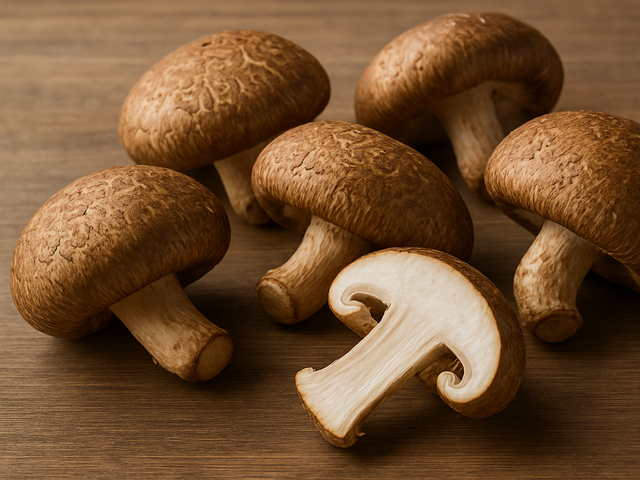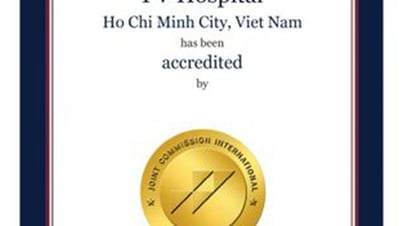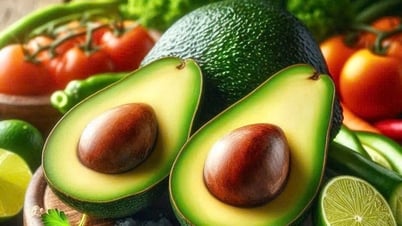Plants rich in vitamins and antioxidants that can help lower blood cholesterol include:
Kiwi

Research shows that eating kiwi every day for eight weeks can help increase "good" HDL cholesterol levels and reduce "bad" LDL cholesterol in people with high blood fat.
PHOTO: AI
Kiwi is a fruit rich in vitamin C. A kiwi weighs between 70 and 100 grams. 100 grams of kiwi provides about 93 mg of vitamin C. Meanwhile, the recommended amount of vitamin C for adult men is about 90 mg/day, and for women is 75 mg/day. In other words, an average kiwi can provide more than the daily requirement of vitamin C.
In addition, kiwi also contains a lot of fiber and antioxidants such as vitamin E, flavonoids or carotenoids, according to health website Healthline (USA).
A study published in the medical journal PubMed found that eating kiwi every day for eight weeks can help increase “good” HDL cholesterol and reduce “bad” LDL cholesterol in people with high blood lipids. What’s more, the antioxidants in kiwis also help reduce oxidative stress, which is a cause of atherosclerosis and other cardiovascular problems.
Lentils
Lentils are a nutritious food rich in protein, fiber, and B vitamins. In particular, lentils are high in soluble fiber, which helps reduce “bad” LDL cholesterol. Lentils also contain antioxidants and minerals that are beneficial to the heart, helping to lower blood pressure and improve heart function.
Apple
Apples are a popular and easy-to-eat fruit, containing a lot of soluble fiber, especially pectin. When entering the intestine, pectin will bind to cholesterol and excrete it, thereby reducing the concentration of harmful cholesterol in the blood.
Additionally, apples are rich in polyphenols, a powerful group of antioxidants that can reduce inflammation and oxidative stress, thereby helping to improve heart health.
Mushroom

Shiitake mushrooms contain many nutrients that help reduce blood cholesterol.
PHOTO: AI
What not everyone knows is that some mushrooms, especially shiitake mushrooms, contain natural compounds such as eritadenine and beta-glucan. These substances have the ability to reduce blood cholesterol. Specifically, eritadenine helps increase cholesterol excretion, while beta-glucan reduces cholesterol absorption in the digestive tract.
Some research evidence shows that regularly eating shiitake mushrooms can significantly reduce total cholesterol and triglycerides in the blood. In addition, mushrooms also contain anti-inflammatory and immune-boosting substances, contributing to cardiovascular support, according to Healthline.
Source: https://thanhnien.vn/4-loai-thuc-vat-giau-vitamin-giup-giam-cholesterol-trong-mau-185250417002521681.htm


![[Photo] President Luong Cuong attends the inauguration of the international container port in Hai Phong](https://vphoto.vietnam.vn/thumb/1200x675/vietnam/resource/IMAGE/2025/5/13/9544c01a03e241fdadb6f9708e1c0b65)
![[Photo] Prime Minister Pham Minh Chinh receives Ambassador of the French Republic to Vietnam Olivier Brochet](https://vphoto.vietnam.vn/thumb/1200x675/vietnam/resource/IMAGE/2025/5/13/f5441496fa4a456abf47c8c747d2fe92)

![[Photo] Many people in Hanoi welcome Buddha's relics to Quan Su Pagoda](https://vphoto.vietnam.vn/thumb/1200x675/vietnam/resource/IMAGE/2025/5/13/3e93a7303e1d4d98b6a65e64be57e870)

![[Photo] President Luong Cuong awarded the title "Heroic City" to Hai Phong city](https://vphoto.vietnam.vn/thumb/1200x675/vietnam/resource/IMAGE/2025/5/13/d1921aa358994c0f97435a490b3d5065)



















































































Comment (0)